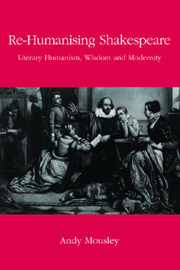Book contents
- Frontmatter
- Contents
- Acknowledgements
- Introduction: Literary Humanism, Wisdom and Modernity
- Part I Denaturing Human Nature
- 1 Questioning the Human: Hamlet
- 2 Emptying the Human: Othello
- 3 Ironising the Human: The Merchant of Venice
- 4 Historicising the Human, Humanising the Historical: I Henry IV
- Part II How to Live
- Conclusion
- Notes
- Bibliography
- Index
2 - Emptying the Human: Othello
from Part I - Denaturing Human Nature
Published online by Cambridge University Press: 12 September 2012
- Frontmatter
- Contents
- Acknowledgements
- Introduction: Literary Humanism, Wisdom and Modernity
- Part I Denaturing Human Nature
- 1 Questioning the Human: Hamlet
- 2 Emptying the Human: Othello
- 3 Ironising the Human: The Merchant of Venice
- 4 Historicising the Human, Humanising the Historical: I Henry IV
- Part II How to Live
- Conclusion
- Notes
- Bibliography
- Index
Summary
In Hamlet scepticism takes the form of a critical, questioning reason. This scepticism comes from inside the play through Hamlet and the critical distance he maintains (most, but not all, of the time) between himself and the belief systems which appeal to nature and human nature as their support. In Othello (1603–4), scepticism is monopolised by Iago and pushed in the direction of an instrumental reason. Questions about what is natural and unnatural are implied by the play, but there are no critical outsiders of the Hamlet variety. The first section of this chapter will take up the play's implied questioning of nature and human nature, and then examine Iago's distortions of critical consciousness. For Iago, I shall argue, questioning human nature is reduced to emptying it. So alarming is this emptying that the need arises to resurrect human nature as an ethical norm that can be used to measure the extent of the inhumanity to which humans are of course not immune.
In Othello various inhumane actions and speeches are performed in the name of the human. The racially mixed marriage between Othello and Desdemona is regarded by Desdemona's father, Brabanzio, as contravening ‘the rules of nature’ which according to him should order the human world. The language used early on in the play by Iago and Roderigo to describe Othello draws on racist stereotypes in its categorisation of Othello as bestial and subhuman: he is ‘an old black ram’ (I, i, 87), ‘a Barbary horse’ (I, i, 113–14), a ‘lascivious Moor’ (I, i, 128).
- Type
- Chapter
- Information
- Re-Humanising ShakespeareLiterary Humanism Wisdom and Modernity, pp. 46 - 59Publisher: Edinburgh University PressPrint publication year: 2007

